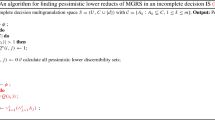Abstract
Knowledge reduction is one of the main problems in the study of rough set theory. This paper deals with knowledge reduction in incomplete information systems based on Dempster-Shafer theory of evidence. The concepts of plausibility and belief consistent sets as well as plausibility and belief reducts in incomplete information systems are introduced. It is proved that a plausibility consistent set in an incomplete information system must be a consistent set and an attribute set in an incomplete information system is a belief reduct if and only if it is a classical reduct.
Preview
Unable to display preview. Download preview PDF.
Similar content being viewed by others
References
Pawlak, Z.: Rough Sets: Theoretical Aspects of Reasoning about Data. Kluwer Academic Publishers, Boston (1991)
Bazan, J.A.: Comparison of dynamic and non-dynamic rough set methods for extracting laws from decision tables. In: Polkowski, L., Skowron, A. (eds.) Rough Sets in Knowledge Discovery: 1. Methodology and Applications, pp. 321–365. Physica-Verlag, Heidelberg (1998)
Beynon, M.: Reducts within the variable precision rough sets model: a further investigation. European Journal of Operational Research 134, 592–605 (2001)
Kryszkiewicz, M.: Comparative study of alternative types of knowledge reduction in insistent systems. International Journal of Intelligent Systems 16, 105–120 (2001)
Li, D.Y., Zhang, B., Leung, Y.: On knowledge reduction in inconsistent decision information systems. International Journal of Uncertainty, Fuzziness and Knowledge-Based Systems 12, 651–672 (2004)
Mi, J.-S., Wu, W.-Z., Zhang, W.-X.: Approaches to knowledge reductions based on variable precision rough sets model. Information Sciences 159, 255–272 (2004)
Nguyen, H.S., Slezak, D.: Approximation reducts and association rules correspondence and complexity results. In: Zhong, N., Skowron, A., Ohsuga, S. (eds.) RSFDGrC 1999. LNCS (LNAI), vol. 1711, pp. 137–145. Springer, Heidelberg (1999)
Slezak, D.: Searching for dynamic reducts in inconsistent decision tables. In: Proceedings of IPMU 1998, Paris, France, vol. 2, pp. 1362–1369 (1998)
Slezak, D.: Approximate reducts in decision tables. In: Proceedings of IPMU 1996, Granada, Spain, vol. 3, pp. 1159–1164 (1996)
Wu, W.-Z., Zhang, M., Li, H.-Z., Mi, J.-S.: Knowledge reduction in random information systems via Dempster-Shafer theory of evidence. Information Sciences 174, 143–164 (2005)
Zhang, M., Xu, L.D., Zhang, W.-X., Li, H.-Z.: A rough set approach to knowledge reduction based on inclusion degree and evidence reasoning theory. Expert Systems 20, 298–304 (2003)
Zhang, W.-X., Mi, J.-S., Wu, W.-Z.: Approaches to knowledge reductions in inconsistent systems. International Journal of Intelligent Systems 21, 989–1000 (2003)
Kryszkiewicz, M.: Rough set approach to incomplete information systems. Information Sciences 112, 39–49 (1998)
Kryszkiewicz, M.: Rules in incomplete information systems. Information Sciences 113, 271–292 (1999)
Leung, Y., Li, D.Y.: Maximal consistent block technique for rule acquisition in incomplete information systems. Information Sciences 153, 85–106 (2003)
Leung, Y., Wu, W.-Z., Zhang, W.-X.: Knowledge acquisition in incomplete information systems: a rough set approach. European Journal of Operational Research 168, 164–180 (2006)
Lingras, P.J., Yao, Y.Y.: Data mining using extensions of the rough set model. Journal of the American Society for Information Science 49, 415–422 (1998)
Slowinski, R., Stefanowski, J.: Rough classification in incomplete information systems. Mathematical and Computer Modelling 12, 1347–1357 (1989)
Stefanowski, J., Tsoukias, A.: Incomplete information tables and rough classification. Computational Intelligence: An International Journal 17, 545–566 (2001)
Wu, W.-Z., Zhang, W.-X., Li, H.-Z.: Knowledge acquisition in incomplete fuzzy information systems via rough set approach. Expert Systems 20, 280–286 (2003)
Zhang, W.-X., Mi, J.-S.: Incomplete information system and its optimal selections. Computers and Mathematics with Applications 48, 691–698 (2004)
Shafer, G.: A Mathematical Theory of Evidence. Princeton University Press, Princeton (1976)
Skowron, A., Grzymala-Busse, J.: From rough set theory to evidence theory. In: Yager, R.R., Fedrizzi, M., Kacprzyk, J. (eds.) Advances in the Dempster-Shafer Theory of Evidence, pp. 193–236. Wiley, New York (1994)
Wu, W.-Z., Leung, Y., Zhang, W.-X.: Connections between rough set theory and Dempster-Shafer theory of evidence. International Journal of General Systems 31, 405–430 (2002)
Yao, Y.Y.: Interpretations of belief functions in the theory of rough sets. Information Sciences 104, 81–106 (1998)
Yao, Y.Y.: Generalized rough set models. In: Polkowski, L., Skowron, A. (eds.) Rough Sets in Knowledge Discovery: 1. Methodology and Applications, pp. 286–318. Physica-Verlag, Heidelberg (1998)
Author information
Authors and Affiliations
Editor information
Editors and Affiliations
Rights and permissions
Copyright information
© 2006 Springer-Verlag Berlin Heidelberg
About this paper
Cite this paper
Wu, W., Mi, J. (2006). Knowledge Reduction in Incomplete Information Systems Based on Dempster-Shafer Theory of Evidence. In: Wang, GY., Peters, J.F., Skowron, A., Yao, Y. (eds) Rough Sets and Knowledge Technology. RSKT 2006. Lecture Notes in Computer Science(), vol 4062. Springer, Berlin, Heidelberg. https://doi.org/10.1007/11795131_37
Download citation
DOI: https://doi.org/10.1007/11795131_37
Publisher Name: Springer, Berlin, Heidelberg
Print ISBN: 978-3-540-36297-5
Online ISBN: 978-3-540-36299-9
eBook Packages: Computer ScienceComputer Science (R0)




